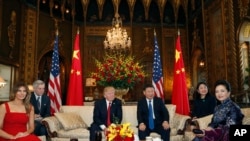American and Chinese officials agree that the two country’s presidents spoke Sunday over the phone.
But exactly what was discussed in the phone call remains unclear.
According to official Chinese media, President Xi Jinping warned President Donald Trump about some “negative factors” hurting U.S.-China relations.
During the call, Xi said China-U.S. relations had made “important outcomes” since his meeting with Trump in April in Florida, state broadcaster China Central Television reported.
But at the same time, the broadcaster said relations had also been affected “by some negative factors.” It added that China had “expressed its position” to the U.S. about those factors.
The broadcaster did not identify specific issues discussed in the call.
A White House statement, however, said Trump discussed the growing threat of North Korea’s nuclear and missile programs with Xi. It said both leaders had repeated their commitment to working toward a “denuclearized Korean Peninsula.”
The statement said Trump also expressed his desire “to seek more balanced trade relations” with America’s trading partners. It added that the two leaders were looking forward to meeting at this week’s G20 meeting in Hamburg, Germany.
Complications in U.S.-China relations
Last week, China's foreign ministry protested to the U.S. over a planned sale of $1.42 billion in military weapons to Taiwan. The ministry called on U.S. officials to cancel the deal, saying it would be harmful to China’s sovereignty.
Other U.S. decisions have recently drawn criticism from China. These include putting U.S. sanctions on a Chinese bank for dealings with North Korea, and accusing China of being one of the world’s worst offenders of human trafficking and forced labor.
Another issue causing tension between Washington and Beijing is Chinese expansion in the South China Sea.
The U.S. Navy has conducted two freedom-of-navigation operations, or FONOPs, in the South China Sea since Trump took office. The operations are meant to challenge Chinese territorial claims in the area.
The latest FONOP took place Sunday when a U.S. Navy destroyer, the USS Stethem, sailed within 12 nautical miles of Triton Island. Triton – which is claimed by China, Taiwan and Vietnam – is part of the Paracel Islands in the South China Sea.
The Chinese foreign ministry said in a statement the U.S. move was "a serious political and military provocation." It added that such operations "violate China's sovereignty and threaten China's security."
China deployed military vessels and fighter jets to the area.
U.S. officials said the Stethem was carrying out a regular "right of innocent passage" exercise. The operation within 12 nautical miles of the island was meant to show that the U.S. does not recognize territorial claims to the island. Twelve nautical miles marks territorial limits recognized internationally.
Trump also spoke with Japanese Prime Minister Shinzo Abe on Sunday. The White House said the two leaders shared a commitment to dealing with North Korea. And the president also looked forward to meeting the prime minister at the upcoming G-20 summit in Hamburg.
I’m Bryan Lynn.
Bryan Lynn wrote this story for VOA Learning English based on reports from VOA News, the Associated Press, Reuters and other sources. Hai Do was the editor.
We want to hear from you. Write to us in the Comments section, and visit our Facebook page.
_____________________________________________________________
Words in This Story
negative – adj. thinking about the bad qualities of someone or something
factor – v. something that helps influence or cause something to happen
outcome – n. something that happens as a result of an activity or process
sovereignty – n. a country's independent authority
sanction – n. an action taken by one or more nations to make another country obey a rule
provocation – n. action causing someone to become angry or take action







